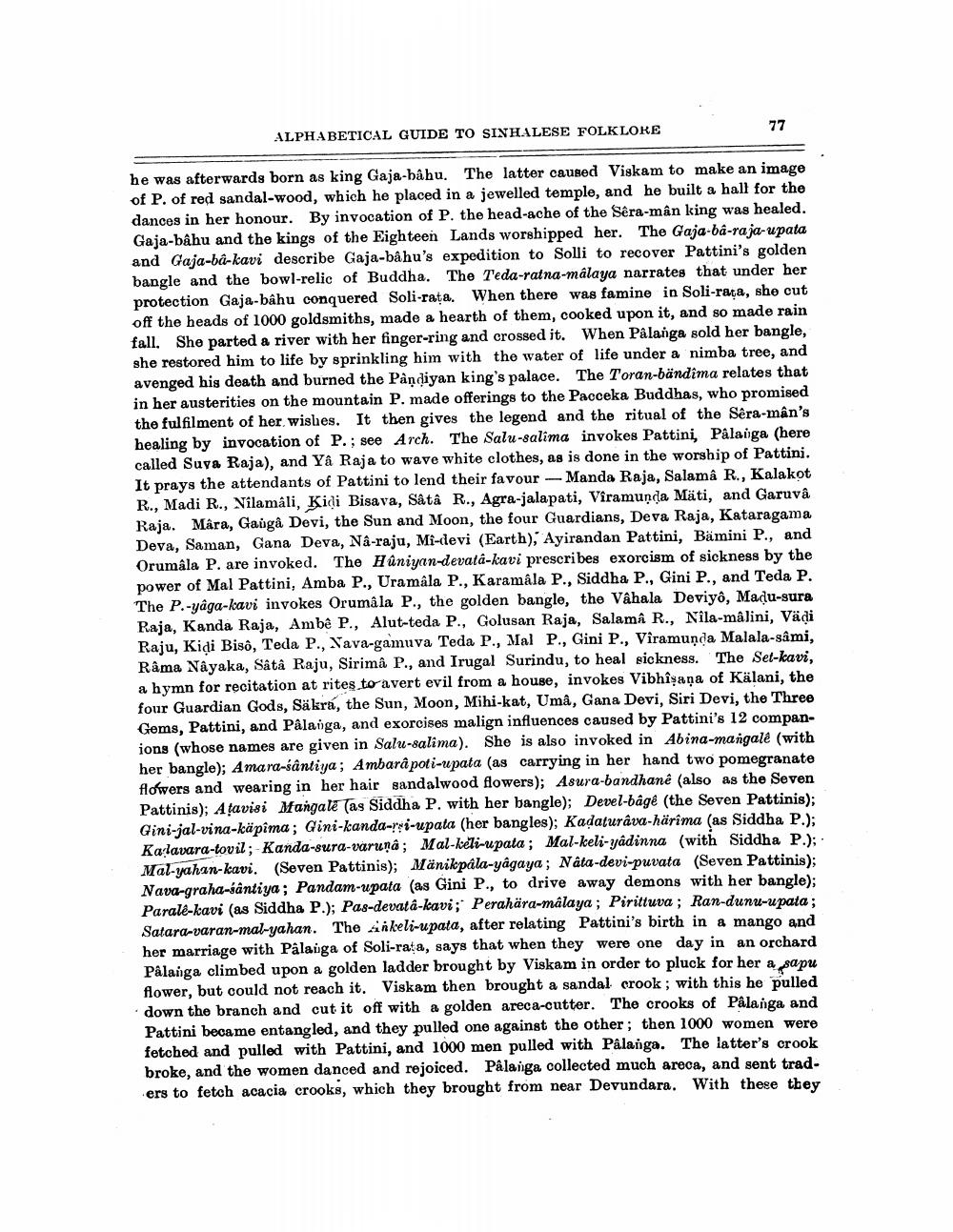________________
ALPHABETICAL GUIDE TO SINHALESE FOLKLORE
77
he was afterwards born as king Gaja-bahu. The latter caused Viskam to make an image of P. of red sandal-wood, which he placed in a jewelled temple, and he built a hall for the dances in her honour. By invocation of P. the head-ache of the Sêra-mân king was healed. Gaja-bahu and the kings of the Eighteen Lands worshipped her. The Gaja-ba-raja-upata and Gaja-ba-kavi describe Gaja-bahu's expedition to Solli to recover Pattini's golden bangle and the bowl-relic of Buddha. The Teda-ratna-malaya narrates that under her protection Gaja-bâhu conquered Soli-rata. When there was famine in Soli-rata, she cut off the heads of 1000 goldsmiths, made a hearth of them, cooked upon it, and so made rain fall. She parted a river with her finger-ring and crossed it. When Palanga sold her bangle, she restored him to life by sprinkling him with the water of life under a nimba tree, and avenged his death and burned the Pandiyan king's palace. The Toran-bändima relates that in her austerities on the mountain P. made offerings to the Pacceka Buddhas, who promised the fulfilment of her wishes. It then gives the legend and the ritual of the Sêra-mân's healing by invocation of P.; see Arch. The Salu-salima invokes Pattini, Palauga (here called Suya Raja), and Yâ Raja to wave white clothes, as is done in the worship of Pattini. It prays the attendants of Pattini to lend their favour - Manda Raja, Salamâ R., Kalakot R., Madi R., Nilamali, Kidi Bisava, Satâ R., Agra-jalapati, Viramunda Mäti, and Garuva Raja. Mâra, Gaugâ Devi, the Sun and Moon, the four Guardians, Deva Raja, Kataragama Deva, Saman, Gana Deva, Na-raju, Mi-devi (Earth), Ayirandan Pattini, Bämini P., and Orumala P. are invoked. The Hûniyan-devata-kavi prescribes exorcism of sickness by the power of Mal Pattini, Amba P., Uramâla P., Karamala P., Siddha P., Gini P., and Teda P. The P.-yaga-kavi invokes Orumala P., the golden bangle, the Vâhala Deviyo, Madu-sura Raja, Kanda Raja, Ambe P., Alut-teda P., Golusan Raja, Salamâ R., Nila-malini, Vädi Raju, Kidi Biso, Teda P., Yava-gamuva Teda P., Mal P., Gini P., Viramunda Malala-sâmi, Râma Nayaka, Satâ Raju, Sirimâ P., and Irugal Surindu, to heal sickness. The Set-kavi, a hymn for recitation at rites to avert evil from a house, invokes Vibhîşana of Kälani, the four Guardian Gods, Säkra, the Sun, Moon, Mihi-kat, Umâ, Gana Devi, Siri Devi, the Three Gems, Pattini, and Palanga, and exorcises malign influences caused by Pattini's 12 companions (whose names are given in Salu-salima). She is also invoked in Abina-mangale (with her bangle); Amara-śântiya; Ambarâ poti-upata (as carrying in her hand two pomegranate flowers and wearing in her hair sandalwood flowers); Asura-bandhane (also as the Seven Pattinis): Atavisi Mangale (as Siddha P. with her bangle); Devel-bâgé (the Seven Pattinis): Gini-jal-vina-käpima; Gini-kanda-rri-upata (her bangles); Kadaturâva-härima (as Siddha P.); Kalavara-tovil ;-Kanda-sura-varuna; Mal-keli-upata; Mal-keli-yadinna (with Siddha P.); Mal-yahan-kavi. (Seven Pattinis); Mänikpala-yagaya; Nata-devi-puvata (Seven Pattinis): Nava-graha-sântiya; Pandam-upata (as Gini P., to drive away demons with her bangle); Parale-kavi (as Siddha P.); Pas-devata-kavi; Perahära-malaya; Pirittuva ; Ran-dunu-u pata; Satara-varan-mal-yahan. The ankeli-upata, after relating Pattini's birth in a mango and her marriage with Palanga of Soli-rata, says that when they were one day in an orchard Pålauga climbed upon a golden ladder brought by Viskam in order to pluck for her a sapu flower, but could not reach it. Viskam then brought a sandal crook; with this he pulled · down the branch and cut it off with a golden areca-cutter. The crooks of Palanga and Pattini became entangled, and they pulled one against the other; then 1000 women were fetched and pulled with Pattini, and 1000 men pulled with Palanga. The latter's crook broke, and the women danced and rejoiced. Palanga collected much areca, and sent trad. ers to fetch acacia crooks, which they brought from near Devundara. With these they




